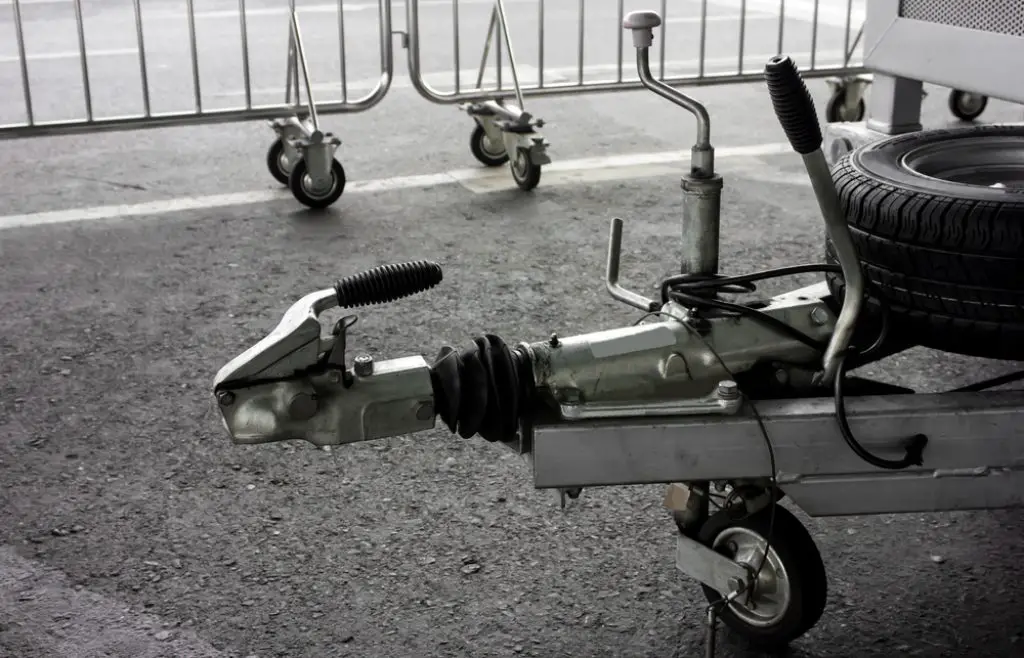We hope you love the products we recommend and just so you know that as an Amazon Associate EngineHoist.net may earn from qualifying purchases.
Venturing out on the open road with a trailer hitched to your vehicle can be an exhilarating (and sometimes frightening) experience, brimming with possibilities.
However, it also entails a crucial responsibility – ensuring your safety and that of others on the road. This comprehensive guide will equip you with indispensable safety tips for towing a trailer, a veritable toolbox for every potential towing situation.
Follow along this article as we detail the most important safety tips for towing a trailer.
Understanding the Basics of Towing a Trailer
Towing a trailer involves attaching a mobile unit – a camper, boat trailer, or cargo trailer – to your vehicle and hitting the road. The particularities of safety precautions depend on the trailer type and the vehicle in tow. Knowledge, as they say, is the bedrock of all accomplishment, and it’s essential to understand the specifics of your unique combination.

Know Your Vehicle’s Towing Capacity
A vehicle’s towing capacity is a key aspect of safe and efficient towing. It refers to the maximum weight your vehicle can pull, and knowing this figure helps prevent unnecessary damage to your vehicle, while also ensuring your safety on the road.
- The Fundamentals of Towing Capacity: Understanding the basics of towing capacity starts with the concept itself. It’s the limit to how much weight your vehicle can haul. This maximum can vary based on factors like the type of equipment used, the vehicle configuration, and the weight of cargo or passengers inside the vehicle. While vehicle manufacturers typically list a rough towing capacity in the owner’s manual, it’s crucial to remember that many other factors influence the actual capacity, including Gross Vehicle Weight Rating (GVWR), Gross Axle Weight Rating (GAWR), Gross Trailer Weight (GTW), and more.
- Demystifying Towing Terms: To fully understand towing capacity, it’s essential to become familiar with some common towing terms and acronyms:
- Gross Vehicle Weight Rating (GVWR): This is the maximum weight a vehicle can handle, including passengers and cargo.
- Gross Combined Vehicle Weight Rating (GCWR): Also known as the maximum towing capacity, this is the total weight of the vehicle, passengers, cargo, trailer, and anything on the trailer.
- Gross Axle Weight Rating (GAWR): This refers to the maximum weight a tow vehicle’s axle can handle. Exceeding this limit can lead to damage.
- Gross Trailer Weight (GTW): This is the total weight of the trailer and the cargo being towed.
- Tongue Weight (TW): This is a measurement of the downward pressure being exerted on the rear of the tow vehicle by the trailer. An incorrect tongue weight can affect towing safety.
- Payload: This is the maximum amount of weight that a vehicle can haul in the cargo area.
- Curb Weight: This is the total weight of the vehicle without passengers or cargo, but includes the weight of all vehicle fluids.
- Calculating Towing Capacity: To calculate your vehicle’s towing capacity, you’ll need to know the GVWR and the curb weight of your vehicle. The formula for this is Towing Capacity = (GVWR – Curb Weight). It’s generally recommended not to exceed 90% of this calculated towing capacity to allow a safety buffer.
- Other Factors Influencing Towing Capacity:
- Vehicle Tow Package: Some vehicles come with special tow packages that can include various features like different transmissions, transmission coolers, suspension modifications, and more.
- Trailer Brakes: If a trailer is equipped with its own brakes, the vehicle can tow a heavier trailer. This is referred to as braked vs. unbraked towing capacity.
- Hitch Class: The class of hitch on your vehicle can also influence towing capacity. Hitch classes range from 1 to 5, with the towing capacity increasing with each class.
- Weight Distribution Hitch: This accessory helps distribute the tongue weight across the tow vehicle, allowing you to tow more weight.
- Wheelbase: The distance between your vehicle’s front and rear axles can also affect towing. A longer wheelbase is generally better for towing heavy loads.
- The Risks of Exceeding Towing Capacity: Towing more weight than your vehicle’s maximum capacity can lead to numerous problems. These include longer stopping distances, additional strain on the drivetrain which could cause engine or transmission damage, and even damage to your vehicle’s axles and frame. Exceeding this limit can also put your trailer and its contents at risk, void your vehicle’s warranty, and increase the likelihood of accidents.
It’s crucial to respect your vehicle’s towing capacity for your safety and that of other road users. If you’re unsure about your vehicle’s towing capacity, always consult with your local dealer or refer to your vehicle owner’s manual.
Preparing Your Trailer for the Road
With the knowledge of your vehicle’s towing capacity at your disposal, the subsequent step involves getting your trailer road-ready. This includes:
- Inspecting the overall condition of your trailer, including lights and tires
- Ensuring an even distribution of load across the trailer
Improper load distribution can lead to instability, potentially resulting in tipping or loss of control.
The Role of Towing Mirrors in Safe Trailer Towing
Towing mirrors extend beyond mere embellishments; they are your safety sentinels. They mitigate the blind spots, offering an expanded field of view, ensuring both your safety and that of other road users. The optimal towing mirror setup should grant a clear view of your trailer’s rear corners and the lanes beside you.
Understanding and Applying Trailer Brake Controller Settings
The trailer brake controller plays an integral role in your towing setup. It regulates the operation of your vehicle and trailer brakes in unison, preventing undesirable scenarios like jackknifing. Understanding and effectively using its settings could be your passport to safety.
Mastering the Art of Maneuvering While Towing a Trailer
Maneuvering a trailer calls for a specific skill set. It encompasses mastering techniques for turning, reversing, parking, and high-speed driving scenarios. Reckless maneuvers such as abrupt overtaking can lead to potentially dangerous situations. Aim for smooth, controlled movements at all times.
Weather Considerations for Safe Trailer Towing
Weather, the capricious factor, can promptly turn a smooth ride into a formidable challenge. From rain to snow or potent winds, adverse weather conditions significantly affect towing safety. Being prepared with safety tips for towing a trailer in challenging weather conditions can guide you through the storm.
Preventing and Handling Trailer Sway
Trailer sway is a phenomenon that involves the trailer oscillating from side to side and can prove perilous if not promptly controlled. The key is not to panic. Gently reduce your speed and steer steadily until you regain control.
Essential Towing Laws and Regulations You Should Know
Understanding and adhering to the legalities of towing is crucial. From trailer dimensions to weight limits and required equipment, these laws are implemented to ensure safe towing practices. Always stay updated on the regulations in your jurisdiction.
Conclusion
Recapping, it’s essential to understand your vehicle’s towing capacity, prepare your trailer correctly, optimize your mirror setup, and adeptly maneuver your trailer. Paired with strategies for handling adverse weather and trailer sway, you are well-equipped to ensure safety while towing. Remember
, towing safety isn’t just about the destination but about cherishing the journey as well.








